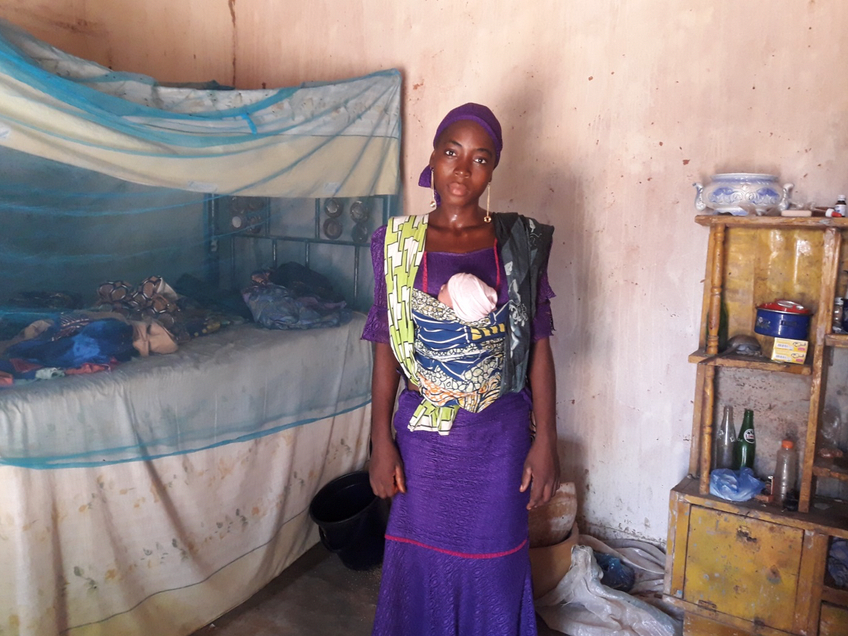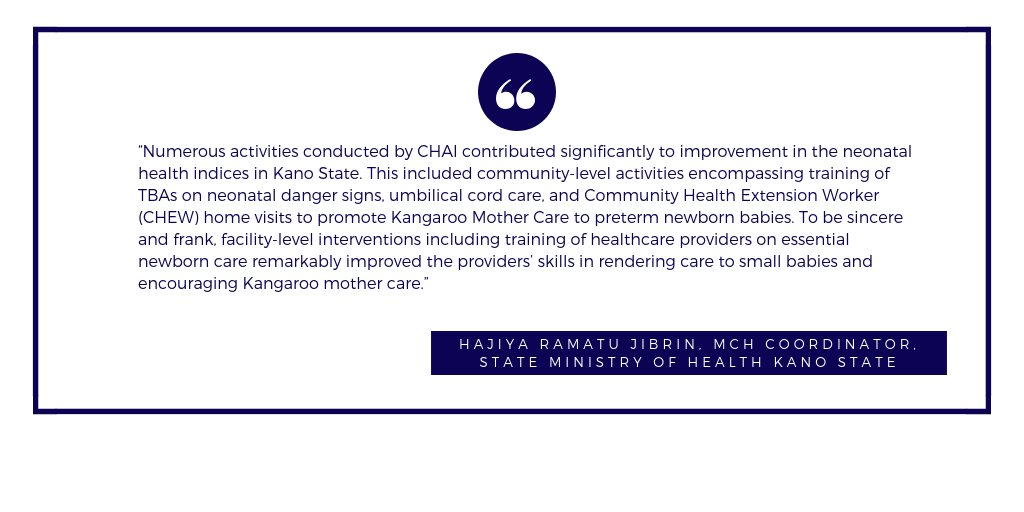It was a bright and sunny day with clear skies in the village of Gafia, in Katsina, Northern Nigeria, when we visited seventeen-year-old Shamsiyya Bello. She welcomed us warmly into her home, stealing loving glances at the sleeping newborn in her arms. She proudly told us that the healthy baby was not born that way. She recounted how she almost lost her now one-month-old son when he was born prematurely at 28 weeks. Shamsiyya recollected how tiny he was at birth and her terror when she did not hear the baby’s first cry. Hinde Bello, a trusted traditional birth attendant (TBA) at the community health center, assisted with the birth. When she saw the baby was not breathing, Hinde jumped to action, using a suction bulb to clear his nose and mouth. Hinde then showed Shamsiyya how to swaddle the now-breathing, crying newborn baby on her chest to keep him warm while Hinde arranged for transport to a hospital. This is called kangaroo mother care, a technique Shamsiyya continues to use. She feels lucky that her baby survived and acknowledges the role of the trained TBA who helped to save her son’s life.
Preterm birth is defined as any live birth that occurs before 37 weeks of pregnancy, the gestational age when key vital organs including the brain, lungs, and circulatory system have developed to maturity. A baby’s brain at 35 weeks weighs only two-thirds what it will when a woman gives birth at full term, at about 40 weeks. Every week early that a baby is born adds significantly to the likelihood of death or serious complication. According to the World Health Organization (WHO), prematurity is the second leading cause of all newborn deaths. An estimated 15 million babies are born premature each year – more than one in 10 babies around the world, and rising – leading to an estimated one million preterm deaths each year. Survivors of preterm birth can face a lifetime of disabilities, including learning disabilities and physical impairments.

Shamsiyya Bello and her baby practicing kangaroo mother care at home in Katsina, Nigeria.
In 2017, Nigeria had the third highest rate of preterm births in the world. An estimated 31 percent of all newborn deaths in Nigeria are directly related to complications of preterm birth. Prevention and proper management of premature births requires skilled care at every level, including high-quality prenatal care from a trained health worker, immediate measures at the health facility should preterm birth occur and, as needed, rapid transport to a comprehensive care facility. However, 64 percent of births across the country occur outside a health facility, without access to life-saving equipment and tools to treat a premature baby, or health workers who can perform the simple interventions which may save their life.
A critical intervention that should take place immediately when a baby is born prematurely is kangaroo mother care. Taking a cue from nature, kangaroo mother care for preterm babies follows the pattern of kangaroos. A newborn kangaroo, or a joey, is normally delivered prematurely and immediately crawls into its mother’s pouch for warmth and nutrition. Kangaroo care for human babies involves a mother tightly swaddling her newborn skin-to-skin on her chest. This provides the baby warmth and the ability to breastfeed regularly for needed nutrients to support critical development.
In 2014, the Federal Ministry of Health conducted field testing across several states to revise the country’s Essential Newborn Care Course (ENCC). CHAI helped consolidate the results of the field testing from various states and ensured incorporation into the revised ENCC curriculum. This included new training modules on kangaroo mother care for preterm babies until they weigh 5.5 lbs. and can maintain a stable body temperate, or until they reach full term, at 40 weeks. CHAI then worked to build consensus among government and partner stakeholders so the adapted guidelines for kangaroo mother care would be widely adopted.
In 2015 and 2016, CHAI supported the states of Kano, Kaduna and Katsina in Northern Nigeria to implement an integrated maternal and newborn health program that led to reductions over an 18-month period in maternal mortality, neonatal mortality and stillbirths by 37 percent, 43 percent and 15 percent respectively. Kangaroo care was a key component in the program’s healthcare worker training package. In Katsina, where over 90 percent of all births take place at home, skilled birth attendants in primary health centers and secondary health facilities, as well as TBAs, were trained to identify and refer preterm birth and train mothers on kangaroo mother care. Hinde Bello, who helped save Shamsiyya’s newborn, benefited from this training and mentoring. CHAI has since worked with state ministries of health to institutionalize kangaroo mother care as the standard for preterm babies.
In 2016 CHAI supported the Federal Ministry of Health to launch the Nigeria Every Newborn Action Plan (NENAP) which provides a vision to end preventable newborn deaths and stillbirths by scaling up high-impact and cost-effective interventions. This national plan serves as the framework for all of Nigeria’s 36 states to adopt context-specific action plans. Key strategies include promoting facility deliveries, ensuring facilities are equipped to provide quality care, including a focus on labor and delivery, and strengthening community-based interventions.
CHAI’s vision for Nigeria is a country without maternal or neonatal death, where every mother has the information and access to high-quality health services she needs for both herself and her child to flourish. Reducing premature birth is possible with strong national commitment and targeted interventions. This World Prematurity Day and every day, CHAI remains steadfastly committed to supporting the federal and state governments of Nigeria to provide the best care possible to prevent and treat preterm birth for a healthier tomorrow.






